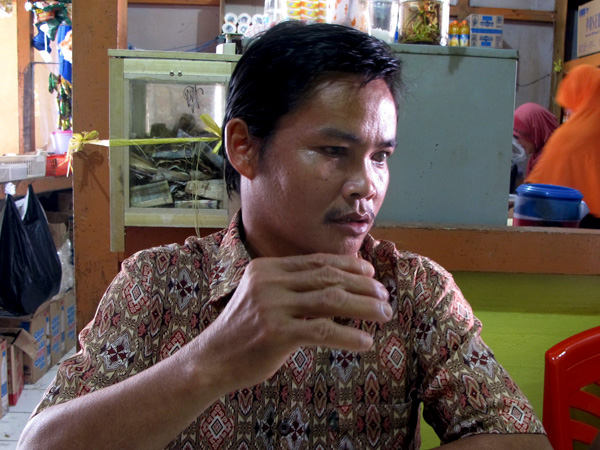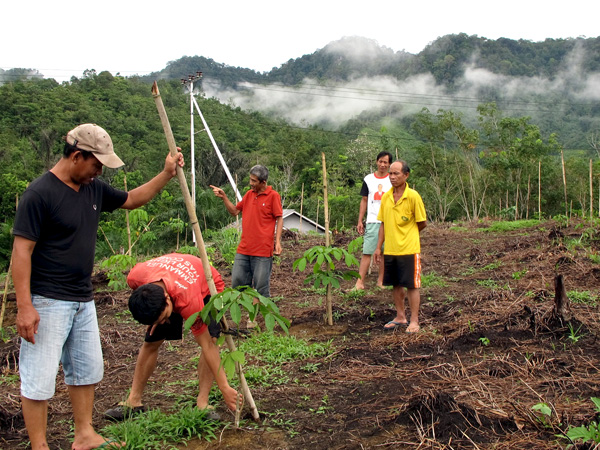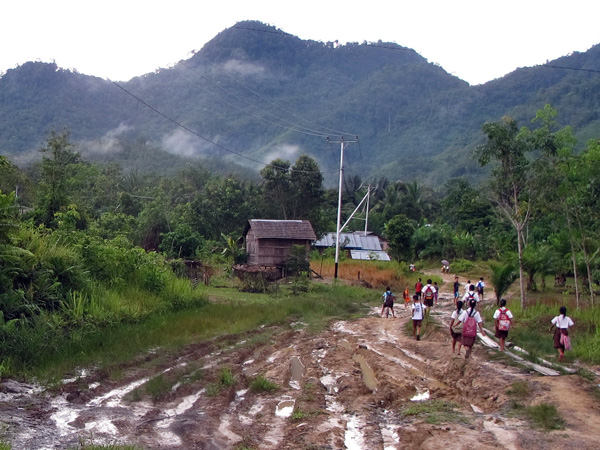- Tanjung residents were approached in 2010 by an oil palm company that wanted to do a deal.
- Around the same time, they were also approached by two groups interested in helping the village protect its forests.
- They have since endeavored to improve and diversify their agricultural practices.
Dingo is a busy man. As the head of Tanjung village, in the Kapuas Hulu region of West Kalimantan, he barely has time for family as he works tirelessly toward making his village “green.” This monumental task has many hurdles, the biggest of which is changing the fundamental beliefs of his neighbors.
“Although our natural resources are abundant,” Dingo told Mongabay, “we are, ironically, a poor village. We rely on our fields and rubber trees. However, space is limited as the areas around our village are protected.”
The village is dependent upon the forest, but traditionally locals have used shifting agriculture methods, where they clear a section of forest to plant crops for a few years before abandoning it to turn fallow and clearing another. Dingo would like to see this practice end, but he has been unable to come up with a workable alternative. Although it is easy to declare a prohibition on clear-cutting village land, without another option the people will simply ignore the ruling.
“We want to restrict the amount of forest being cleared,” he explained, “but without an alternative, this will just shift the activities of the villagers to the protected forests around us.”
He knows a key piece of the equation is to improve the community’s economic standing. To that end, he began brainstorming ideas for developing village enterprises, increasing existing crop yields and establishing ecotourism as an alternative source of income.
“I realized that if the community’s economy remains below standard, the rate of deforestation will only increase,” Dingo said.

Ironically, a fast-track to wealth came in 2010. All it required was for the village to sacrifice the forests Dingo is struggling to protect.
“We are not sure where they were from,” Dingo said of the oil palm company that offered to buy their land, “but fortunately the majority of our citizens rejected their offer. Some people say that money flows in with the palm oil, but we don’t believe that. Instead, we considered the environmental impact, the loss of our forest, and the certain pollution of our river.”
Fortuitously, around the same time the village was approached by two other groups interested in helping Tanjung protect its forests: WWF-Indonesia and the People Resources and Conservation Foundation.
“It was like a breath of fresh air,” Dingo recalled. “We realized that without the help of outside parties it would be difficult to solve the issues of Tanjung.”
With the NGOs’ assistance the village began working to improve existing practices. They received training in how to increase rubber yields and develop more efficient nurseries. They learned different high-yield management practices and adopted organic methods. They began networking with other farmers’ groups that provided them access to more profitable markets.

Further, the village worked to map and gain official recognition of their ownership of their traditional-use forests. Finally, in 2014, Tanjung was granted that ownership by the Forestry Ministry (since merged with the Environment Ministry) and given sole management authority over 2,520 hectares. It is a big responsibility, but one Dingo feels they are now well-positioned to handle. He is optimistic that with NGO assistance they can find ways to both sustainably manage the forest while improving the village economy.
So far his plan appears to be working. Recently, the price of rubber dropped to 5000 rupiah per kilogram. Although each family only averages six kilograms per day, they have been able to supplement their income with their diversity of newly planted cash crops including coffee and chocolate. At the same time, the village is optimistic about developing an ecotourism program that will provide further income during difficult times.
Dingo believes they are now closer than ever to reaching their collective goal: to become green and independent.

CITATION:
Andi Fachrizal. “Tekad Hijau Desa Tanjung di Kaki Pegunungan Muller.” Mongabay-Indonesia. 23 May 2015.







